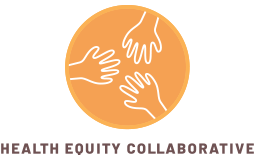
Resources & Action
The Health Equity Collaborative invites your organization to join our open letter to the 119th Congress and Trump Administration, urging them to prioritize health equity and address pervasive health disparities faced by our communities.
Please use this form to sign on if your organization would like to be included in the effort.
Health Equity Guidelines
Health Equity Guidelines for the 119th Congress and Trump Administration
Health Equity Guidelines for the 118th Congress and Biden Administration
Health Equity Guidelines for the 118th Congress and Biden Administration – Spanish Version
Health Equity Guidelines for the 117th Congress and Biden Administration
Health Equity Guidelines for the 116th Congress and Trump Administration

Research
Health Equity Collaborative, Guidelines Letter One-Pager
Health Equity Collaborative, PBM Reform One-Pager
5/21/2025 Special Report: CBO Data Review Reveals Dramatic Increase in 340B Drug Pricing Program
4/9/2025 Report: Profiles in Courage: Leaders Empowering Underserved Populations in Congress
10/30/24 White Paper: The State of U.S. Charity Care – Solutions to Improve the Patient Experience and Achieve More Equitable Health Outcomes
1/31/2024 White Paper: Putting Profits Over Patients: HOW THE CORPORATIZATION OF AMERICAN HEALTHCARE IS IMPACTING DIVERSE COMMUNITIES
07/26/22 White Paper: Improving Health Outcomes Through Social Determinants of Health Initiatives
02/16/22 White Paper: Drivers of Rising Health Care Costs and their Impact on Vulnerable Populations
12/10/21 White Paper: Driving Diversity and Inclusion in Health Care Research and Access
One-Pagers
Health Equity Collaborative, About Us
PBM Reform One-Pager, Health Equity Collaborative
Health Equity Collaborative, 2023 Highlights
Health Equity Collaborative, 2022 Highlights
Health Equity Collaborative, 2021 Highlights

Coalition Letters
07/02/2025 Coalition Letter: 17 Organizations Urge Congress to Confront RFK Jr.’s Attacks on Established Vaccine Science
06/12/23 Coalition Letter: 13 Diverse Organizations Call on FDA to Protect Vulnerable Newborns from Aluminum Toxicity
02/10/22 Coalition Letter: 35 Diverse Health Advocacy Organizations Urge CMS to Prioritize Equity & Access to Alzheimer’s Treatments
12/03/21 Letter to Congress: Senate Must Pass Build Back Better With Healthcare Transparency Provisions To Protect Vulnerable Patients
12/03/21 Coalition Letter: Greater Oversight and Accountability of Federal Relief Program Needed to Combat Food Insecurity
05/19/21 Coalition Letter: Over 50 Organizations Call on Congress to Triple Funding for CDC’s Alzheimer’s Disease and Healthy Aging Program
07/07/20 Coalition Letter: Lawmakers Should Increase SNAP Benefits During the Coronavirus Crisis and Its Aftermath
05/11/20 Coalition Letter: 39 Multicultural Advocates and Public Health Organizations Call For More COVID-19 Help For Vulnerable Communities
Educational Videos
Health Equity and PBM Reform
The State of U.S. Charity Care and the 340B Program
Respiratory Disease Season & Diverse Communities: What Can You Do to Stay Healthy?
Health Equity Matters
Advancing Health Equity - A Call to Action
All Stakeholders Should Be Held Accountable for the Rising Cost of Care
PBM Transparency and Reform
Rebate Reform to Lower Prescription Drug Costs
HEC Members Speak Out on the Rising Cost of Healthcare and PBMs


